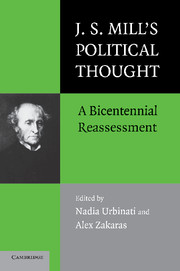Book contents
- Frontmatter
- Contents
- List of Contributors
- Introduction
- PART ONE LIBERTY AND ITS LIMITS
- 1 Mill on Liberty and on the Contagious Diseases Acts
- 2 Rational Freedom in John Stuart Mill's Feminism
- 3 The Many Heads of the Hydra: J. S. Mill on Despotism
- 4 J. S. Mill and Liberal Socialism
- 5 The Method of Reform: J. S. Mill's Encounter with Bentham and Coleridge
- PART TWO DEMOCRACY AND THE INDIVIDUAL
- PART THREE BEYOND NATIONAL BORDERS
- Bibliography
- Index
5 - The Method of Reform: J. S. Mill's Encounter with Bentham and Coleridge
Published online by Cambridge University Press: 08 January 2010
- Frontmatter
- Contents
- List of Contributors
- Introduction
- PART ONE LIBERTY AND ITS LIMITS
- 1 Mill on Liberty and on the Contagious Diseases Acts
- 2 Rational Freedom in John Stuart Mill's Feminism
- 3 The Many Heads of the Hydra: J. S. Mill on Despotism
- 4 J. S. Mill and Liberal Socialism
- 5 The Method of Reform: J. S. Mill's Encounter with Bentham and Coleridge
- PART TWO DEMOCRACY AND THE INDIVIDUAL
- PART THREE BEYOND NATIONAL BORDERS
- Bibliography
- Index
Summary
In the preface to Considerations on Representative Government (1861), J. S. Mill addresses his work to those Liberals and Conservatives who, in his view, seem ‘to have lost confidence in the political creeds which they nominally profess’ in recent debates on parliamentary reform (CW XIX: 373). He notes that although this loss of confidence seems to have taken place, no better creed has presented itself to either side. We thus encounter in the two creeds two opposing views without any obvious means of reconciling them or moving to a better doctrine or doctrines or to parliamentary reform. Nevertheless, Mill holds out for a better doctrine – not a compromise between the two, but another perspective ‘which, in virtue of its superior comprehension, might be adopted by either Liberal or Conservative without renouncing anything which he really feels to be valuable in his own creed’ (CW XIX: 373).
Mill's starting point of addressing opposing views and looking for ways to reconcile them from a different perspective is not simply a rhetorical flourish. In the Considerations, we find echoes of Mill's approach in the famous essays on Bentham (1838) and Coleridge (1840): Mill begins with contrary doctrines forming an opposition that he then overcomes. Although it would be wrong to see these remarks in the Considerations as a simple restatement of views taken in these earlier essays, the arguments seem to presuppose the essays as well as the development of his political thought prior to their composition.
- Type
- Chapter
- Information
- J.S. Mill's Political ThoughtA Bicentennial Reassessment, pp. 124 - 144Publisher: Cambridge University PressPrint publication year: 2007
- 7
- Cited by

